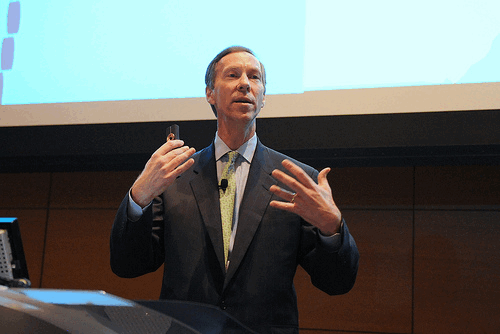We are living in a changing economy where even the experts are unsure of what’s to come. It is imperative now more than ever before to have effective leadership in the next generation of managers as well as among those currently serving in managerial roles. With that in mind, it makes sense that the Wharton Business School would title their 15th annual leadership conference, “Leading in a Reset Economy and Uncertain World.”
I was able to attend this one-day conference yesterday, which was held on the Wharton campus in Philadelphia, and I must say, it was the best conference I have ever attended thus far. The first of eight speakers was F. William (Bill) McNabb III, head of The Vanguard Group, an investment company with $1.8 trillion under management, making it one of the largest investment management firms in the world.
McNabb didn’t land the job of president and CEO of this mammoth money managing machine by relying on luck. He knows a thing or two about leadership and he shared his wisdom with the 200 or so in attendance, starting off with what he calls “the leadership standard,” which entails:
- Managing crew
- Developing crew
- Relationship management
- Leadership impact
- Business results
- Conceptual thinking
- Business acumen
Using a military analogy, McNabb asked the crowd if they would chose to be in a fox hole with those they manage. “You have to have total trust within your team,” he said. “This is the most important element to building a high-performing working group.” McNabb is adamant that complete trust within a team inevitably equals effective production and superior performance. Seeing the success of Vanguard, it’s hard to argue with the man.
One thing people may find interesting, and maybe a bit peculiar, is that McNabb does not believe in competition across different areas of the organization. “There are no competing departments,” he said. “We measure results holistically — actions are tied to the firm’s results, not individual results.”
When asked about how he measures the success of the firm, he quickly replied, “The only thing that matters for us at the end of the day is if we’re making money for our clients. We have no formal measurement of success — [the client’s success] is what we go on.”
Another audience member questioned the fact that he failed to mention the hot button term “innovation” during his entire presentation. Good question, I thought. But that thought vanished after listening to McNabb’s response:
“We don’t want to be innovative because we don’t want to play around with people’s money,” he said, adding that innovation should be left to research and development and manufacturing companies, not firms that handle other people’s money and act as fiduciaries.
Well put, McNabb.
Check back over the next several days for more posts relating to the amazing speakers I was fortunate enough to hear at the Wharton Leadership Conference, including Jen Deal of the Center for Creative Leadership, James Quigley, author of As One and senior partner at Deloitte and Colonel Jack Jacobs, NBC analyst and recipient of the Medal of Honor.

